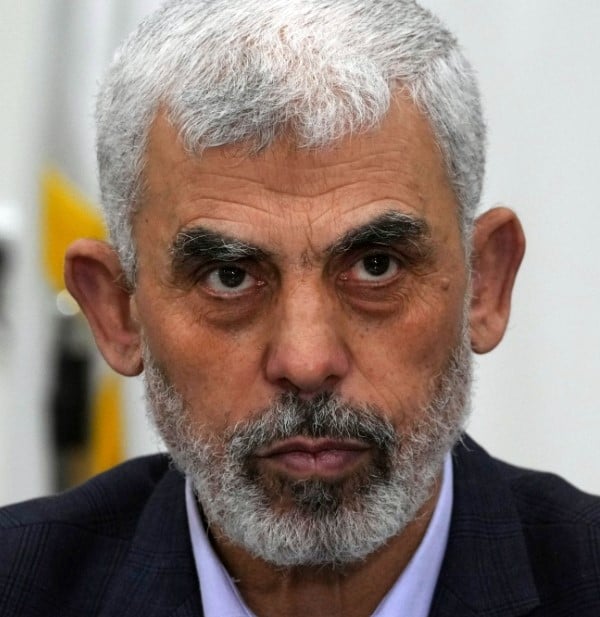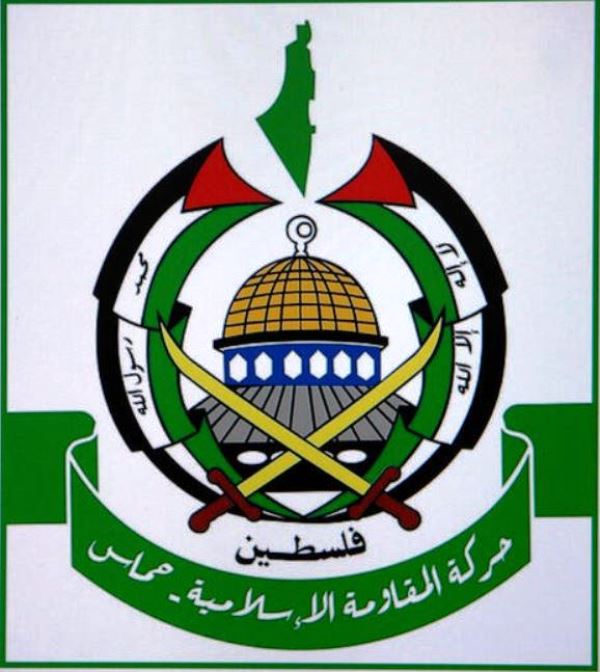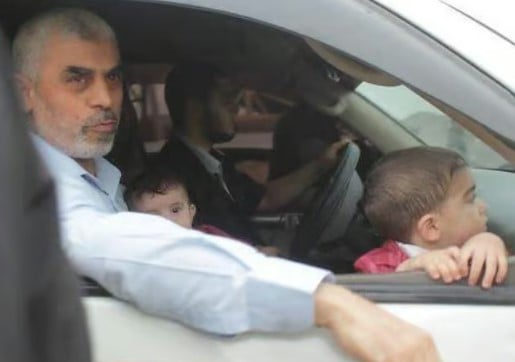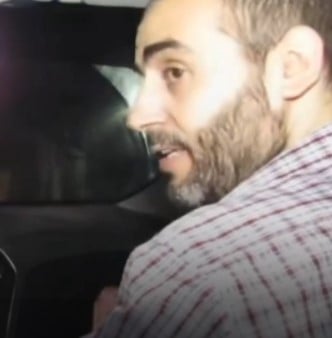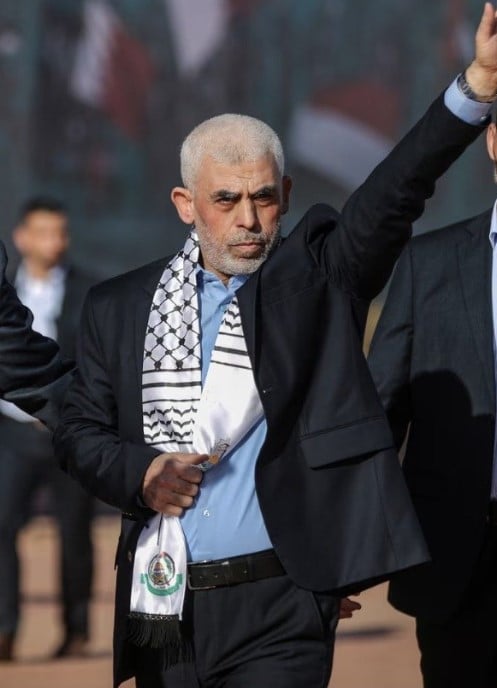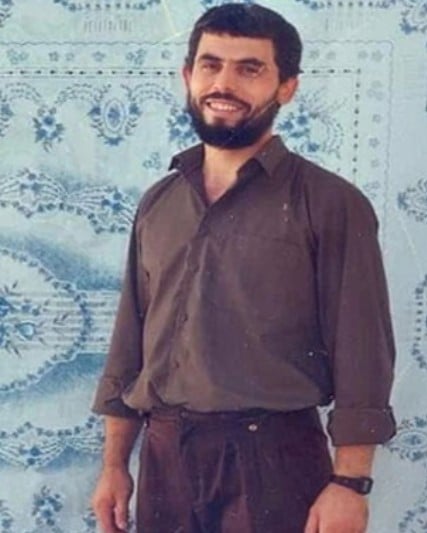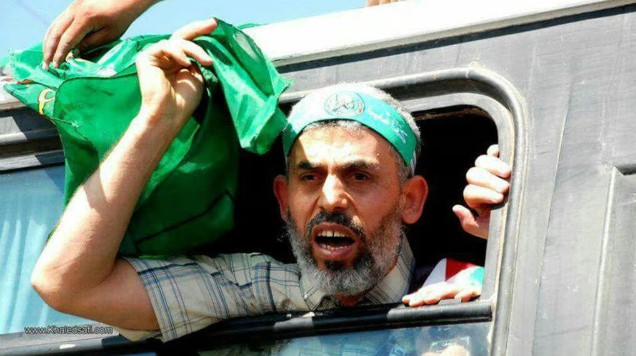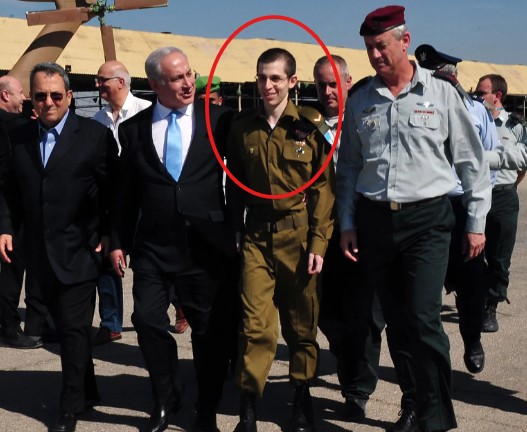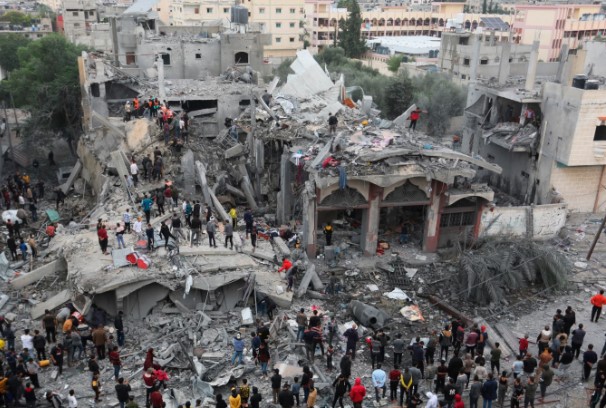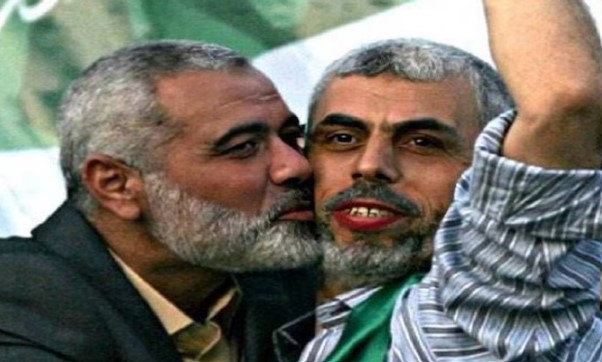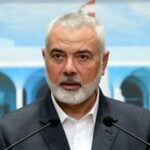Yahya Sinwar Age, Death, Wife, Family, Biography
Quick Info→
Age: 61 Years
Death Cause: Killed In Action
Death Date: 16/10/2024
Some Lesser Known Facts About Yahya Sinwar
- Sinwar’s family was forced to leave their home in Al-Majdal Asqalan (now Ashkelon) during the 1948 Arab-Israeli War.
- After that, they sought refuge in the Gaza Strip.
- While growing up in a refugee camp, Yahya Sinwar got connected with Hamas.
- He was first arrested in 1982 for revolutionary activities. During this period, he met other Palestinian activists, including Salah Shehade, in Far’a prison.
- He was arrested again in 1985. After being released, Yahya Sinwar co-founded Majd, an organization that identified the Palestinians who work for Israel.
- In 1987, Majd became the Hamas ‘police.’
- Yahya Sinwar earned the nickname ‘The Butcher of Khan Younis’ for killing people who were suspected of teaming with Israel.
- In 1988, he planned the kidnapping and killing of two Israeli soldiers and the murder of four Palestinians whom he believed were working with Israel.
- Yahya Sinwar was arrested in February 1988 and confessed to killing the four Palestinians: one was strangled, another suffocated with a kaffiyeh, third was accidentally killed during interrogation, and the fourth was shot during a kidnapping attempt.
- Later, he showed investigators the location where the bodies were buried.
- In 1989, Yahya Sinwar was sentenced to four life sentences.
- While in prison, he was suspected of ordering the beheadings of two other suspected informants, whose severed body parts were thrown out of cells.
- Yahya Sinwar was highly respected by fellow prisoners for his cleverness. He made several escape attempts, including digging a tunnel under his cell.
- After coming out of prison, he worked with many Hamas leaders, smuggled cell phones, and sent messages to visitors.
- Many of these messages involved plans to kidnap Israeli soldiers for prisoner exchanges.
- Yahya Sinwar later said in the media that capturing an Israeli soldier gave prisoners hope for their release.
- His time in prison was a turning point in his life as it helped him to shape his leadership abilities, as noted by senior Hamas official Ghazi Hamad.
- He learned Hebrew, the official language of Israel, through an online program and studied Israeli news to better understand his opponents.
- Yahya Sinwar translated Hebrew autobiographies of former Shin Bet chiefs into Arabic and shared them with inmates to study counterterrorism strategies.
- He called himself a ‘specialist in the Jewish people’s history.’
- Yahya Sinwar told supporters that prison was meant to break them, but they turned it into places for worship and study.
- During his imprisonment, he took 15 courses through the Open University of Israel for over seven years, starting in 1995.
- Yahya Sinwar studied history topics like the Jews in the Second Temple and Rabbinic periods, the First Temple period, the Holocaust, and Zionism, as well as political science focusing on Israeli governance and democracy.
- Hamas leaders in prison are elected democratically. Committees manage daily tasks, while an ’emir’ and a high commission oversee big decisions for short terms.
- In 2004, Yahya Sinwar was appointed as an emir with his companion Rawhi Mushtaha.
- During this period, he stayed humble and participated in daily activities like cooking with other prisoners, and even making knafeh to build connections.
- In 2004, Yahya Sinwar started experiencing symptoms like fainting during prayer and neck pain. A prison dentist, Yuval Bitton, suspected a serious brain issue and recommended urgent hospitalization.
- At Soroka Medical Center, Israeli surgeons removed his brain tumour that could have been fatal. Without surgery, the tumour would have burst.
- After the surgery, Yahya Sinwar expressed his thanks to the dentist through a Muslim prison officer, explaining how important the life-saving surgery was in Islam and how he felt indebted.
- After that, he began meeting regularly with the dentist, focusing their discussions on Hamas ideology and ignoring any chance of a two-state solution. They claimed that the land belonged to Muslims.
- During a cell search, guards found a handwritten novel by Yahya Sinwar, completed in 2004, titled ‘The Thorn and the Carnation.’ The novel was about a boy from Gaza, Ahmed, living under Israeli occupation during the 1967 Arab-Israeli War. It reflected Sinwar’s own experiences and the Palestinian opposition.
- In 2005, he warned Israelis to ‘be scared’ of Hamas’s election victory in an interview with an Israeli TV outlet, but he privately said that Hamas was much dependent on the Israeli government’s actions.
- Yahya Sinwar stated that Hamas sought rights from Israel, but not total control of the entire region.
- In 2011, he played a major role in negotiating the release of Israeli soldier Gilad Shalit.
- Even after over a thousand prisoners were freed, Sinwar’s refusal to compromise caused tension within Hamas leadership, mainly with Saleh al-Arouri, who was more willing to negotiate.
- He attempted to organize a hunger strike involving 1,600 Hamas prisoners and made the negotiations more difficult.
- After some time, his influence decreased, and other Hamas leaders made a deal without him. He was placed in solitary confinement by Israeli authorities.
- In 2011, Yahya Sinwar became the highest-ranking Palestinian prisoner who was released in exchange for Gilad Shalit, along with 1,026 others.
- In a Hamas TV interview after his release, he encouraged further efforts to kidnap Israeli soldiers for future prisoner exchanges.
- Soon, Sinwar was elected to a key military position within Hamas, similar to that of a defence minister.
- In November 2012, during an Israeli operation in Gaza, he met Iranian General Qasem Soleimani in Tehran. He later strengthened cooperation between Hamas, Hezbollah, and Iran after becoming Hamas’s Gaza leader in 2017.
- Sinwar was believed to have supervised the torture and execution of Mahmoud Ishtiwi, a Qassam Brigades commander, in 2016. Ishtiwi was accused of theft, homosexuality, and providing Israel with information that led to a deadly bombing in 2014.
- In February 2017, Sinwar was secretly elected as the leader of Hamas in Gaza, replacing Ismail Haniyeh.
- He formed a Hamas-controlled administrative committee for Gaza in March 2017, opposing power-sharing with the Palestinian Authority and rejecting any reconciliation with Israel.
- Sinwar was committed to military conflict, believing it was the only way to ‘liberate Palestine,’ and called for the capture of more Israeli soldiers.
- In September 2017, negotiations with the Palestinian Authority began in Egypt, and Sinwar agreed to dissolve Hamas’s administrative committee for Gaza.
- He ordered against using tunnels for attacks in 2017, overruling hard-line members.
- On 16 May 2018, Sinwar announced on Al Jazeera that Hamas would pursue ‘peaceful, popular resistance’ against Israel, suggesting the possibility of Hamas engaging in negotiations with Israel.
- A week before announcing peaceful resistance, Sinwar encouraged Gazans to breach the Israeli barriers, saying that they would rather die as martyrs than from oppression and humiliation and that tens of thousands were ready to die with him.
- On 1 December 2020, Sinwar tested positive for COVID-19 but remained in good health and continued his duties as usual.
- In March 2021, Sinwar was re-elected for the second time to a four-year term as Hamas leader in Gaza.
- On 15 May 2021, an Israeli airstrike hit Sinwar’s home in Khan Yunis, though no immediate reports of injuries were released. In the following week, Sinwar appeared in public at least four times.
- During a press conference on 27 May 2021, he angrily asked Israeli Defense Minister Benny Gantz to order his assassination as he walked through Gaza’s streets, where he took photos with the public.
- In 2022, Hamas began planning a surprise attack on Israel, with Sinwar trying to involve Iran and Hezbollah in a wider conflict to destroy Israel.
- In September 2022, Sinwar examined battle plans for the attack. In May 2023, Sinwar and his colleagues dropped the conflict plans during Ramadan and postponed it for the 7 October 2023 surprise attack.
- Sinwar, along with Mohammed Deif, was the mastermind behind the 7 October 2023, Hamas-led attack on Israel, which was the deadliest in Israeli history, leaving around 1,200 people dead and about 240 hostages taken to Gaza.
- Following the attack, Sinwar was placed under European Union terrorist sanctions and became a top target for assassination by the Israeli military.
- Israeli intelligence believed that Sinwar was hiding in a tunnel system under Gaza while using hostages as human shields.
- After three weeks of fighting in the Israel-Hamas war, Sinwar proposed a prisoner exchange i.e. all Palestinian prisoners in Israeli confinement for the release of all hostages taken by Hamas.
- According to some media reports, Sinwar visited the hostages during the conflict, assuring them that they would not be harmed. When questioned by a hostage named Yocheved Lifshitz, who told Sinwar that he should be ashamed, Sinwar remained silent.
- On 7 November 2023, Israel claimed that they trapped Sinwar in a bunker near Gaza City, but later suspected he had moved to Khan Yunis and then to Rafah in the southern Gaza Strip, Palestine.
- The Israeli military then announced a $400,000 reward for information leading to Sinwar’s location.
- In February 2024, the Israeli Defense Forces (IDF) believed that Sinwar was unable to command Hamas forces in person because he was continuously relocating.
- On 20 May 2024, the International Criminal Court (ICC) prosecutor, Karim Khan, announced plans to seek an arrest warrant for Sinwar on charges of war crimes and crimes against humanity, related to the ongoing investigation in Palestine.
- In June 2024, The Wall Street Journal published some leaked communications in which Yahya Sinwar allegedly claimed that Israeli civilian deaths were the ‘necessary sacrifices’ for Palestine’s rise to glory.
- The authenticity of these messages was not verified, and Hamas spokesperson Ghazi Hamad denied that Sinwar made such remarks. Hamad stated that Sinwar was focused on ending the conflict.
- On 31 July 2024, after the assassination of Ismail Haniyeh, Hamas named Yahya Sinwar as the new overall leader of the movement and chairman of the Hamas Political Bureau.
- This decision was made after a unanimous vote by the Shura Council, which is responsible for electing Hamas’s political bureau, and was seen as a message of defiance to Israel.
- On 3 September 2024, the U.S. Department of Justice announced criminal charges against Yahya Sinwar for his role in the 7 October 2023 attack on Israel, including conspiracy to support a terrorist organization and murder U.S. nationals.
- On 17 October 2024, the Israeli military reported that they were investigating whether he was killed during an operation in Gaza a day earlier.
- The next day, DNA analysis confirmed that Yahya Sinwar was killed in the operation.
- After that, Israeli Prime Minister Benjamin Netanyahu declared Sinwar’s death as the beginning of a new era. He encouraged Gazans to break free from Hamas rule and showed mercy to hostage-takers who surrendered.
- He was fluent in Hebrew, which he learned during his time in prison, and he also had an understanding of Israeli culture.
- Yahya Sinwar was a hafiz, a person who had completely learned the Quran.

